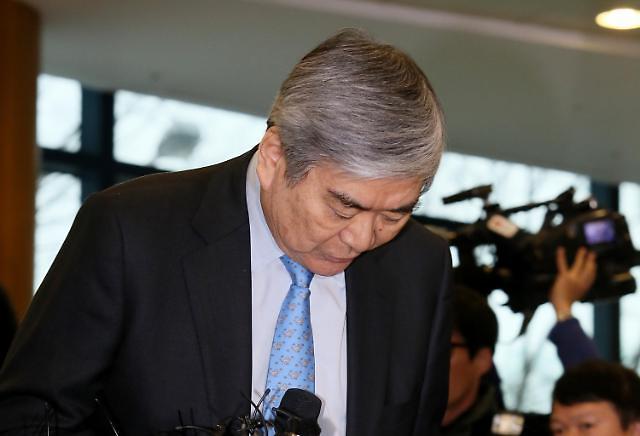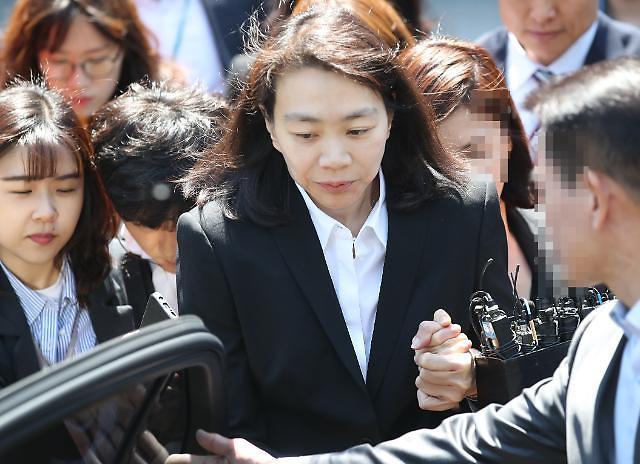
Cho Yang-ho [Aju News DB]
SEOUL -- South Korea's scandal-stricken Hanjin Group came under pressure from an influential domestic shareholder to take "effective" measures in enhancing corporate governance, reflecting growing anxiety among investors over the group's future.
As South Korea's largest institutional investor with an investment of more than 130 trillion won ($121 billion) in local stocks, the National Pension Fund (NPS) has maintained a neutral stance in the management of private companies.
In an unusual move on Tuesday, a committee of private experts tasked with enhancing the fund's independence in the exercise of stock voting rights expressed concern that Hanjin's worsened corporate reputation is feared to hurt the fund's long-term profitability and increase uncertainty.
"We demand that the Hanjin Group take more effective measures to solve problems and improve its management system," the committee said in a statement, suggesting the fund should exercise its shareholder rights.
The fund is Korean Air's second-largest shareholder with a 12.45 percent stake and owns 11.81 percent of Hanjin KAL Corp., the group's holding company. The ruling Cho family controls about 25 percent of Hanjin KAL.
The committee's move came on the heels of multiple investigations by tax officials, law enforcement authorities and government bodies into the ruling family's illegal activities, abuse of power, assaults, tax evasion and smuggling of luxury goods.
The group has been under pressure to enhance its corporate governance since Hanjin Shipping, which used to be South Korea's largest container carrier, was liquidated in February last year. Public demands for Hanjin's complete overhaul gained moment this year following a scandal involving Cho Hyun-min, the youngest daughter of Hanjin Group patriarch Cho Yang-ho.

Cho Hyun-min, the youngest daughter of Cho Yang-ho. [Photograph by Yoo Dae-gil = dbeorlf123@ajunews.com]
Police have questioned Cho Hyun-min on charges of assault. She lost her temper during a business meeting on March 16 and threw a glass cup at an advertising company official. The incident hurt Korean Air's reputation, and many South Koreans saw it as emblematic of a generation of spoilt and arrogant offspring of the country's conglomerate owners.
Her mother, Lee Myung-hee, 69, has been widely criticized as a typical example of "Gapjil" that means an abuse of power such as mistreatment, arrogant behavior, crude talk, character assassination, and insults. Allegations about Lee's insulting remarks and abusive treatment of her personal staff and construction workers renovating her home fueled public anger.
Lee's eldest daughter, Cho Hyun-ah, who formerly served as Korean Air vice president, was interrogated over allegations that she brought in personal goods purchased overseas without paying taxes and illegally hired Filipino housemaids. She was once arrested in 2014 for an onboard tantrum when served macadamia nuts in a bag rather than a bowl. She was imprisoned for a year for violating aviation law but she was released in May 2015 after an appeals court suspended her sentence.
South Korea's family-run business groups, known as chaebol, were once described as the engine of prosperity and credited for powering the post-war economic miracle, despite their autocratic leadership and dynastic succession practices.
In an interview with Aju News last month, Fair Trade Commission (FTC) Chairman Kim Sang-jo called for a proper mental attitude among third-generation offsprings of chaebol owners, warning third-generation offsprings could lose their status unless they meet the demands of society.
The previous growth model that led to South Korea's economic success has lost its momentum, Kim said, adding the government is trying hard to establish a new economic order such as income-driven growth because there is no new model yet to replace old models
Lee's eldest daughter, Cho Hyun-ah, who formerly served as Korean Air vice president, was interrogated over allegations that she brought in personal goods purchased overseas without paying taxes and illegally hired Filipino housemaids. She was once arrested in 2014 for an onboard tantrum when served macadamia nuts in a bag rather than a bowl. She was imprisoned for a year for violating aviation law but she was released in May 2015 after an appeals court suspended her sentence.
South Korea's family-run business groups, known as chaebol, were once described as the engine of prosperity and credited for powering the post-war economic miracle, despite their autocratic leadership and dynastic succession practices.
In an interview with Aju News last month, Fair Trade Commission (FTC) Chairman Kim Sang-jo called for a proper mental attitude among third-generation offsprings of chaebol owners, warning third-generation offsprings could lose their status unless they meet the demands of society.
The previous growth model that led to South Korea's economic success has lost its momentum, Kim said, adding the government is trying hard to establish a new economic order such as income-driven growth because there is no new model yet to replace old models
.




